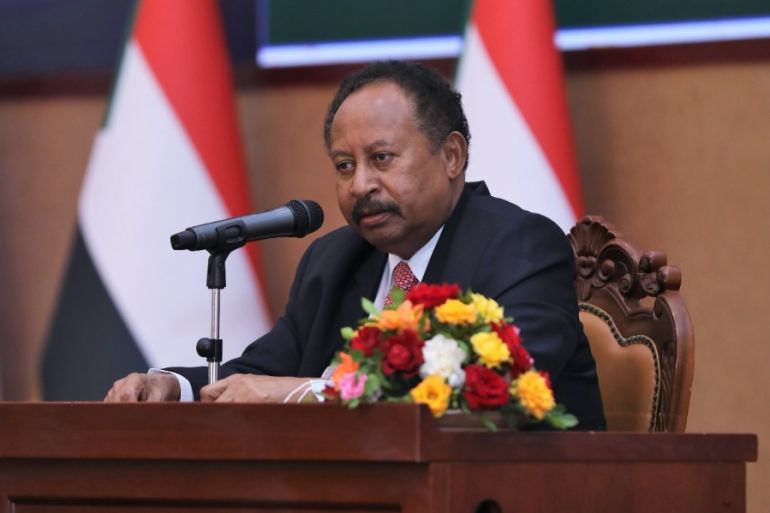Sudan’s reinstated PM Hamdok promises a path to democracy
Hamdok tells Al Jazeera a technocratic interim government will lead Sudan, after signing a deal with the military.

Newly reinstated Sudanese Prime Minister Abdulla Hamdok has pledged to introduce a “technocratic government” made up of qualified professionals who will lead the country on a path to democracy nearly a month after a military coup.
In an exclusive interview with Al Jazeera, Hamdok – who was deposed by the military on October 25 but reinstated as interim premier after signing a deal on Sunday with Sudan’s top general to restore the transition to civilian rule – said the new government will be independent.
Keep reading
list of 3 itemsSudan’s coup is on shaky ground
Sudan activists promise escalation after deadliest day since coup
Hamdok said the cabinet currently being formed will focus on establishing a constitutional conference and holding elections by June 2023, to complete “the transition to democracy and its related obligations”.
“You all know that [holding] the elections will require one full year at least, and it may drag on for one and a half years,” he said, hours after he signed the political agreement with General Abdel Fattah al-Burhan.
Hamdok had been under house arrest by the military for weeks. The military also dissolved his cabinet and arrested a number of civilians who had held top positions under a power-sharing deal agreed after the popular overthrow of longtime ruler Omar al-Bashir in 2019.
The 14-point deal between Hamdok and the military, signed in the presidential palace in Khartoum on Sunday, also provides for the release of all political prisoners detained during the coup and stipulates that a 2019 constitutional declaration be the basis for a political transition, according to details read out on state television.
The coup has drawn international criticism. Sudanese people have been taking to the streets en masse since the military takeover, which upended the country’s fragile transition to democracy.
At least 41 people have been killed during confrontations with police since the coup, as security forces have at times used live rounds to disperse anti-coup demonstrators.
Hamdok pledged to launch an independent probe into the killings and violations committed, and said the deal was signed to “avoid further bloodshed”.
‘Absolute liberty’
Hamdok told Al Jazeera the agreement ensures the prime minister has the “power and the authority” to form an independent and technocratic government in “absolute liberty and without any pressure”.
However, it remains unclear how much power the upcoming government is going to hold.
The appointment of cabinet ministers has to be approved by the Sovereign Council, which is headed by al-Burhan.
Pro-democracy activists have rejected Sunday’s deal and have pledged to step up anti-military rallies. They have also rejected any form of negotiation or partnership with the army.
The Forces of Freedom and Change (FFC) civilian coalition, which had been sharing power with the military, said it did not recognise any agreement with the armed forces.
The Sudanese Professionals Association (SPA) on Sunday also rejected the political deal.
Though many disagree with the development, Hamdok said he signed the agreement as he is driven by the “responsibilities” placed on his shoulders.
“I have made up my mind and signed this political agreement, although I know that many may disagree, object, or reject it simply because the people’s ambitions and aspirations were much higher,” he said.
The former UN economist said he does not have any “personal ambitions” to remain a leading figure beyond the transitional period, and has no interest in joining a particular party or group.
“I reiterate that I do not have any personal gains, otherwise I wouldn’t have accepted the office in the first place with all its challenges over the past two years,” Hamdok said.
Cameron Hudson, former chief of staff for the US special envoy to Sudan, said protests could now be held against both the military and Hamdok following the deal.
The deal was a “major compromise on the part of the prime minister,” Hudson told Al Jazeera, as it essentially validates what has been called “bad behaviour” by this coup.
“Protesters have every right to be concerned about what message this sends to the country and to the prospects of the democratic transition,” he added.
Meanwhile, several countries have welcomed the deal.
United States Secretary of State Antony Blinken said his country is “encouraged” by the agreement, but cautioned authorities against using excessive force to quell protests.
“I am encouraged by reports that talks in Khartoum will lead to the release of all political prisoners, reinstatement of Prime Minister Hamdok, lifting of the state of emergency, and resumption of coordination,” Blinken wrote on Twitter.
“I also reiterate our call for security forces to refrain from excessive force against peaceful protesters,” he said.